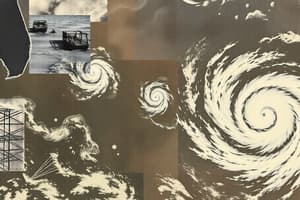Podcast
Questions and Answers
What are some catastrophic consequences of cyclones?
What are some catastrophic consequences of cyclones?
High winds, heavy rainfall, storm surges, tornadoes
How can early warning systems help in cyclone prevention?
How can early warning systems help in cyclone prevention?
By notifying communities of approaching cyclones and giving people time to take necessary precautions
Explain how disaster preparedness can help in dealing with cyclones.
Explain how disaster preparedness can help in dealing with cyclones.
By creating evacuation plans, stockpiling emergency supplies, and building sturdy homes and infrastructure
What role does coastal management play in reducing the impact of cyclones?
What role does coastal management play in reducing the impact of cyclones?
How does climate change mitigation relate to reducing the impact of cyclones?
How does climate change mitigation relate to reducing the impact of cyclones?
What are extratropical cyclones formed from?
What are extratropical cyclones formed from?
What are the effects of cyclones?
What are the effects of cyclones?
How can cyclones cause flooding?
How can cyclones cause flooding?
What are some prevention strategies for cyclones?
What are some prevention strategies for cyclones?
Why is understanding the formation, types, and effects of cyclones important?
Why is understanding the formation, types, and effects of cyclones important?
Flashcards are hidden until you start studying
Study Notes
Understanding Cyclones
Cyclones are intense low-pressure weather systems that originate from a combination of Earth's rotation and instabilities in the atmosphere. These storms can unleash destructive forces, making it crucial to understand their formation, types, effects, and prevention.
Formation
Cyclones form when there is a large temperature difference between air masses, causing the warmer air to rise and the cooler air to sink. This vertical motion creates a low-pressure center, which in turn leads to further air circulation. The Coriolis effect, due to Earth's rotation, deflects the wind flow, causing it to spiral inward towards the low-pressure center. This spiraling action is what we call a cyclone.
Types
Cyclones have two main types: tropical cyclones and extratropical cyclones.
-
Tropical cyclones (formerly known as hurricanes or typhoons) form over warm oceans and have their energy source solely from the release of heat energy from the ocean surface. They are fueled by a warm and moist atmosphere, and their intensity is measured by the Saffir-Simpson Hurricane Wind Scale for Atlantic and Northeast Pacific storms or the Australian Tropical Cyclone Intensity Scale for Southwest Pacific storms.
-
Extratropical cyclones form in mid-latitude regions and have their energy source from temperature contrasts between warm and cold air masses. They are also known as "winter storms" or "nor'easters." These storms can produce heavy snow, rain, strong winds, and blizzard conditions.
Effects
Cyclones can result in catastrophic consequences, some of which include:
- High winds: Cyclones produce strong winds, which can cause damage to buildings, trees, and power lines.
- Heavy rainfall: Cyclones can produce heavy rainfall, leading to flooding, landslides, and erosion.
- Storm surges: Cyclones can cause storm surges along coastal areas, resulting in devastating flooding.
- Tornadoes: Tropical cyclones can spawn tornadoes, which cause further damage and loss of life.
Prevention
Cyclone prevention strategies are primarily focused on reducing the effects of cyclones rather than stopping them from forming. Here are some preventive measures:
- Early warning systems: Governments and weather agencies must invest in early warning systems to notify communities of approaching cyclones, giving people time to take necessary precautions.
- Disaster preparedness: Communities must be prepared for cyclones by creating evacuation plans, stockpiling emergency supplies, and building sturdy homes and infrastructure.
- Coastal management: Coastal management strategies, such as beach nourishment and the construction of seawalls, can help reduce storm surge damage.
- Climate change mitigation: Reducing greenhouse gas emissions is crucial in mitigating the impact of cyclones, as climate change is resulting in more frequent and intense storms.
Understanding cyclones is essential for predicting their behavior, preparing for their impacts, and reducing their associated risks. By studying cyclones, we can better mitigate their effects and develop strategies to minimize their impact on communities.
Studying That Suits You
Use AI to generate personalized quizzes and flashcards to suit your learning preferences.




